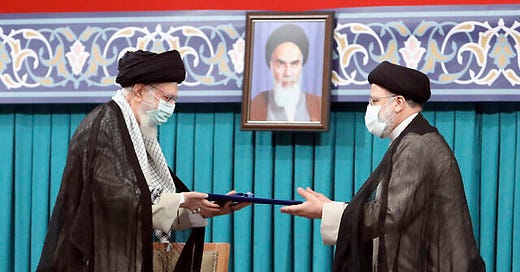Iran: Meet the New Boss, Same as the Old Boss
The long game for U.S. policy needs to focus on Iran’s regional actions and how it treats its own people, as well as the nuclear program
Iran’s new president Ebrahim Raisi took office this week, prompting much speculation about what this will mean for Iran, the region, and a U.S. regional policy focused on putting diplomacy first and getting back to a nuclear deal with Iran.
The shift in power isn’t likely to mean much in terms of Iran’s approach to its own people and its foreign policy. Iran’s elections are not free and democratic, and Raisi appears cut from the same cloth as the real power in Iran, Supreme Leader Ayatollah Ali Khamenei. Despite repeated signs of a desire for change among the people of Iran, the autocratic power structures inside of the country maintain a firm grip. Carnegie Endowment senior fellow Karim Sadjadpour noted earlier this summer in The Atlantic,
“As long as Iran’s security forces remain united and willing to kill en masse, and Iran’s society remains disunited and unwilling to die en masse, the tipping points will continue to tip in the regime’s favor.”
If Iran isn’t likely to respond to the desires for change among many of its own people, what are the prospects for a major shift in its approach in its foreign policy? Given Tehran’s recent track record, the odds seem very slim that its actions in the Middle East and more broadly will get better anytime soon.
Here are ten actions linked to Iran in 2021 as the United States and other global powers engaged the country in diplomatic efforts aimed at returning to some nuclear deal with Iran:
A drone attack last week against an oil tanker off the coast of Oman that left two crew members dead, the latest in a string of Iranian attacks against international shipping this year.
A plot to abduct an Iranian-American journalist and activist living in the United States and take her to Iran, foiled by federal law enforcement.
Ongoing cyberattacks, including a phishing campaign targeting U.S. military personnel and a cyber-ransom attempt against Saudi Aramco – the world’s largest oil producer.
Support for Iraqi militias that have attacked U.S. military and diplomatic personnel stationed in Iraq and waged a campaign of assassination and intimidation against Iraqi political activists.
The delivery of increasingly advanced rocket and drone technology to Palestinian terrorist groups like Hamas use to launch indiscriminate attacks against Israel.
Continued backing for the Assad regime in Syria, including support for militias attacking U.S. troops in the country’s northeast.
Ongoing material support for Yemen’s Houthis, in particular the provision of drones and missiles that the Yemeni faction uses to attack Saudi Arabia.
Hostage-taking and unlawful detention of fifteen foreigners and dual nationals, including four American citizens and one permanent U.S. resident.
A plot to attack the United Arab Emirates embassies in Ethiopia and Sudan, thwarted by global cooperation among intelligence services.
Apparent drone attacks against Jordan over the past year.
At home, moreover, Iran remains a repressive theocracy that treats its own people abysmally. The regime denies ordinary Iranians – women, religious minorities, and political dissenters in particular – their basic rights and freedoms. An American presidential administration committed to the notion of a global contest between autocracy and democracy needs to keep the human rights of the Iranian people on the agenda in its deliberations over Iran policy.
However, much of the debate and discussion of Iran policy dwells almost exclusively on the Iran’s nuclear program and efforts to revive the 2015 diplomatic agreement that constrained it. A key lesson from the 2015-2018 period, as argued in this report:
“For years, the ingredient missing from discussions of U.S. policy toward Iran has been incremental progress on improving the regional security environment in the Gulf and the wider Middle East. That ingredient, no matter how tactical and incremental it may appear, remains necessary to foster a better regional atmosphere in which to address Iran’s nuclear program and other concerns that spur mistrust and have produced a volatile environment in the region.”
The nuclear issue remains important, but it shouldn’t remain the exclusive focus of America’s policy toward Iran. Instead, the United States can and should address Iran’s destructive international actions – both in the Middle East and around the world – as well as its poor treatment of its own populace at the same time it pursues a diplomatic solution to the nuclear question.
By adding these currently missing ingredients, the Biden administration can forge a truly forward-looking Iran policy – and one that’s more stable and sustainable in the region and back here in the United States.






